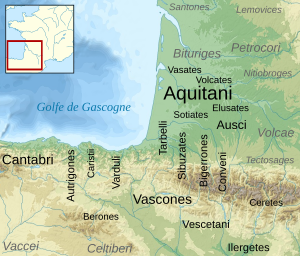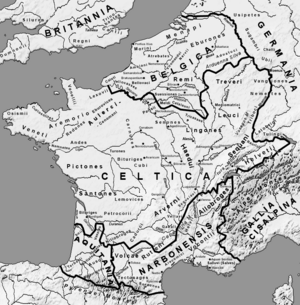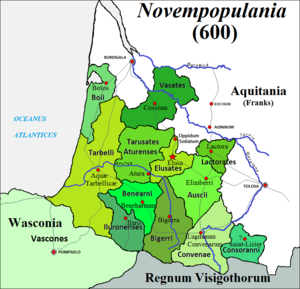Aquitani facts for kids
The Aquitani were an ancient group of people who lived in a region that is now southwestern France. This area was located between the Pyrenees mountains, the Atlantic ocean, and the Garonne river. This was around the 1st century BCE.
The Romans called this region Gallia Aquitania. Important Roman writers like Julius Caesar and Strabo clearly said that the Aquitani were different from other peoples in Gaul. They also noted that the Aquitani were similar to people living in the Iberian Peninsula (modern-day Spain and Portugal).
Over time, as the Romans took control, the Aquitani slowly started to use Latin (the Roman language) and adopted Roman civilization. Their original language, called Aquitanian language, is thought to be an early form of the Basque language. It also influenced the Gascon language, which is a Romance language spoken in Gascony.
History of the Aquitani
When the Romans conquered Gaul, Julius Caesar defeated the Aquitani. He wrote that they were a distinct part of Gaul.
All Gaul is divided into three parts. The Belgae live in one part, the Aquitani in another. Those who call themselves Celts in their own language, and whom we call Gauls, live in the third part. All these groups are different from each other in language, customs, and laws. The Garonne river separates the Gauls from the Aquitani.
Caesar also described where Aquitania was located:
Aquitania stretches from the Garonne river to the Pyrenees mountains. It also reaches the part of the ocean near Hispania (Spain). It faces between the setting sun (west) and the north star (north).
This shows that even though the Aquitani had cultural and language links to the Vascones (who lived in what is now Spain), Caesar saw Aquitania as ending at the Pyrenees mountains.
Aquitani and the Basque Language
Many experts in languages and history believe that the Aquitanian language was closely related to an older form of the modern Basque language. This idea comes from old Roman-Aquitanian stone carvings, like those on tombs and altars. These stones have names of gods or people that sound very similar to names in modern Basque.
Julius Caesar clearly stated that the Aquitani lived in what is now southwestern France and spoke Aquitanian. They were different from their Celtic neighbors to the north. Later, in the Early Middle Ages, this region was known as Vasconia. This name later changed to Gascony. This, along with other old place names, seems to support the idea that the Aquitanian language was connected to Basque.
Aquitani Tribes
The land where the original Aquitani lived later became known as Novempopulania (meaning "nine peoples") during the late Roman Empire and early Middle Ages. However, the actual number of tribes living there was much higher. Some ancient writers mentioned around 20 tribes, while others listed 32 or 33 different groups.
Some of the important Aquitani tribes included:
- Ausci in the east, near the city of Auch.
- Benearni or Benearnenses in the area of low Béarn.
- Bigerriones in the western part of the French Pyrenees.
- Sotiates in the north, near Sos-en-Albret.
- Tarbelli along the coast of the Landes region.
- Vasates in the north, near Bazas.
There were also related peoples living just south of the Pyrenees mountains, in what was then northern Hispania Tarraconensis. These included the Iacetani and the Vascones.
See also
 In Spanish: Aquitanos para niños
In Spanish: Aquitanos para niños
- Aquitanian language
- Gauls
- Novempopulania
- Gallia Aquitania
- Duchy of Vasconia
- Vascones
- Iberians
- Gascony
- Late Basquisation
- Pre-Roman peoples of the Iberian Peninsula
 | Anna J. Cooper |
 | Mary McLeod Bethune |
 | Lillie Mae Bradford |




